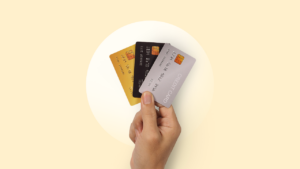4 ways to stay organized when you have multiple cards

Key takeaways
- The number of credit cards you can successfully manage depends on how organized you are.
- Use a system to keep track of your cards and use specific cards for assigned purposes, such as dining or groceries.
- Keep up with card payments by aligning due dates or using autopay.
- If you can manage multiple cards successfully — including on-time payments — you might see a boost to your credit score.
The average American has 3.9 credit cards in their wallet, according to Experian. While it’s not uncommon to juggle multiple cards, having more cards in your wallet means a higher potential to miss payments, owe fees for cards you’re not using, charge more than you can comfortably repay or not maximize rewards.
The number of credit cards you can manage effectively depends largely on how organized you are. Here’s how to stay organized while maximizing the rewards that come with holding multiple cards.
1. Have a system to keep track of multiple credit cards
Whether you use a personal finance app, spreadsheet or even a handwritten list, organize your credit card accounts so you can track your balances, due dates, reward categories and annual fees.
An online bill pay app can manage your credit card accounts at a glance, providing a convenient way to keep track of your card activity.
Money tip: When you sign up for new cards, make sure to track the spending needed and time limit to earn points or miles when it comes to welcome offers.
2. Assign a purpose to each credit card
Assigning a specific purpose to each of your credit cards — like dining out or online shopping — can help you maximize the rewards you earn on your spending. If you have a card that’s among the best credit cards for groceries and another card offering strong rates on travel, using each card to maximize its bonus categories can reap the highest cash back, points or miles on your spending.
Using your cards for specific spending can also simplify budget tracking. If you use one card for dining and entertainment and another for bills, you’ll more easily see how much you’re spending in each category. And tracking can also help you better remember features to make the most of the benefits your cards offer.
3. Carry only the cards you actually use
The more cards you have, the more potential there is for one to become lost or stolen — or face temptation to spend more with them. To manage this risk, physically carry only those cards you use frequently and store the rest at home.
To stay ahead of fraud, regularly check your credit card statements for unusual activity. And consider enabling transaction alerts and using apps that let you freeze and unfreeze your card accounts.
4. Stay on top of multiple payment schedules
Managing payment due dates is crucial when balancing multiple credit cards. It can be easy to overlook a payment if you’re not sure of the due date and become caught up in your day-to-day life. But missed payments can lead to late fees and negatively affect your credit score.
Most card issuers allow you to change your card’s due date to better match your budget, streamline your bill payment process and reduce the risk of missing a payment. Call the customer support number on the back of your card to ask about updating your payment due date or see if it’s possible to adjust online.
Setting up autopay is another way to manage multiple payment schedules. With autopay, your payment is automatically deducted from your bank account each month on the due date or on a date you choose. This helps to make sure your bills are paid on time every month, which can increase your credit score.
How multiple credit cards can be good for your credit score
A clear benefit to successfully manage multiple credit cards is gaining access to more credit. Credit gives you the ability to pay for big purchases and emergencies without going over your credit limit or dramatically affecting your credit utilization ratio — a factor that accounts for 30 percent of your credit score.
Managing your cards wisely — which includes paying your bills on time and keeping your utilization ratio low — can improve your credit score. But be smart and have a strategy for each card you add. For example, don’t add a travel credit card to your wallet if you’re a homebody. You’d be better off with a cash back card that covers popular categories like dining, gas and groceries.
More tips for managing multiple credit cards
Organization is key when you have multiple credit cards. When you’re organized, you can make payments on time and not worry about missing them and taking a possible hit to your credit score.
Google Calendar is a good tool because not only can you set payment dates and times, you can color-code your bills and add up to four more pop-up notifications (with custom times) for further reminders. Another is Google Spreadsheets, which offers flexibility when tracking cards, payments and rewards. There are many other tools and services that let you set alerts.
Sometimes, simple is best. Romy Ribitzky, Bankrate’s vice president of SEO, has two Barclays and two American Express cards.
I manage both payments and points by logging in twice monthly — on the 1st and 15th — to schedule payments and check on my points and rewards balance.
— Romy Ribitzky Vice president of SEO, Bankrate
Mark Rosenberg, Bankrate’s director of licensing and legal compliance, has 17 credit and charge cards that are all on autopay. “A month or so before applying for a new card, if I’m concerned about utilization or number of cards with balances, I make a pass through the card apps every day or two and pay any balances,” he says. “I trust card issuers and loyalty programs to track the points, and I check to make sure significant points earned are received.”
The bottom line
There are myriad ways to keep track of credit cards, payments and rewards in boosted categories. Try out different options and decide which works best for you.
Before applying for a new card, compare the best credit cards available to find one that fits your budget, lifestyle and financial goals.
Why we ask for feedback Your feedback helps us improve our content and services. It takes less than a minute to complete.
Your responses are anonymous and will only be used for improving our website.







